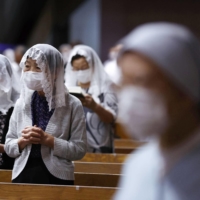Nagasaki – Nagasaki marked the 76th anniversary Monday of the U.S. atomic bombing of the city in World War II, with its mayor set to urge the Japanese government to take a more active role in realizing a world free of nuclear weapons.
At the annual memorial ceremony, Mayor Tomihisa Taue was expected to urge the government to sign and ratify a U.N. treaty banning nuclear weapons and join as an observer in its first meeting of state parties to the treaty, which came into effect in January.
The anniversary of the 1945 attack on the southwestern Japanese city comes as dependence on nuclear deterrence continues to grow.
Prime Minister Yoshihide Suga was also to deliver a speech during the ceremony at the city’s Peace Park, while Izumi Nakamitsu, U.N. undersecretary-general and high representative for disarmament affairs, was set to read a message on behalf of U.N. Secretary-General Antonio Guterres.
While the Japanese government has repeatedly pledged to lead the international community toward the abolition of nuclear weapons, it has refused to participate in the nuclear ban treaty, along with the world’s nuclear-weapon states.
The pact, which currently has 86 signatory states, marks the first comprehensive ban on nuclear weapons.
Japan has maintained its three principles of not producing, possessing or allowing nuclear arms on its territory. But the country sits under the U.S. nuclear umbrella and hosts its military facilities under a decades-old bilateral security accord.
The ceremony will once again cut attendance numbers to around 500 guests, roughly a 10th of the number in recent years, to prevent overcrowding amid a nationwide resurgence of coronavirus cases.
Representatives from around 65 countries, including all five recognized nuclear powers — Britain, China, France, Russia and the United States — are expected to attend.
A plutonium-core atomic bomb codenamed “Fat Man” exploded over Nagasaki at 11:02 a.m. on Aug. 9, 1945, three days after the United States dropped the world’s first such weapon to be deployed on Hiroshima.
An estimated 74,000 people died from the bombing in Nagasaki by the end of that year, according to the city.
The combined number of surviving victims of the two atomic bombings, known in Japan as hibakusha, stood at 127,755 as of March, down about 8,900 from a year earlier, the Ministry of Health, Labor and Welfare said, adding their average age was 83.94.
In a time of both misinformation and too much information, quality journalism is more crucial than ever.
By subscribing, you can help us get the story right.
SUBSCRIBE NOW




